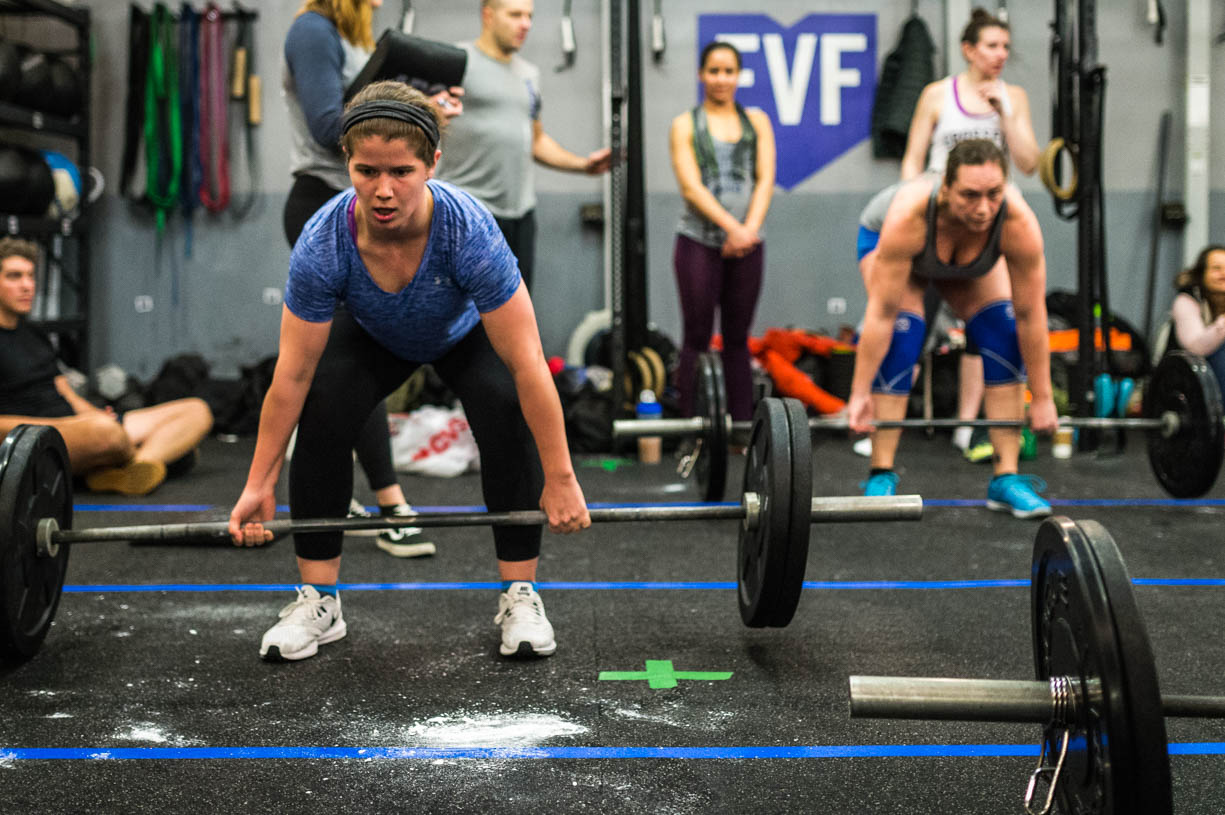Open Prep 2018: Nutrition & Performance
The CrossFit Open is a great time to celebrate and test your fitness — either against the world, the region, our gym, or just yourself. That being said, you can narrow the Open down to two routes: competition or fun. If you treat the Open as a competition, either against yourself or the world, keep reading for some ways to boost your performance. If you’re doing the Open for fun, we offer tips on improving your everyday performance and health.
Q: How do I eat during the CrossFit Open?
A: Let’s break this down into three categories to describe how to best prepare yourself for an Open workout on Saturday: (1) Pre-Workout, (2) Game Day, and (3) Post-Workout/Recovery.
(1) Pre-Workout: Pre-workout nutrition isn’t just minutes or hours before you try 18.1; it is actually a fueling process 24 to 48 hours before Saturday. It takes the body 24+ hours to truly replenish your glycogen stores (glycogen = fuel for your muscles), which means in order to be as fueled as possible and set yourself up for success, you need to make sure you’re eating enough Thursday AND Friday.
Q: What should I eat during the “pre-workout” phase?
A: Not a whole lot should change. The best thing you can do is stay consistent and maintain your macro goals, but you can add a small amount of carbs (25 to 50 grams daily) to your current macros on Thursday and Friday to in a sense guarantee replenished glycogen stores.
Good sources to add 25 to 30 grams of carbs include rice (white or brown), potatoes (white or sweet), pasta, quinoa, and oatmeal.
(2) Game Day (i.e. Saturday): Don’t make any drastic changes to your current macro plan. Saturday is not the day to decide all of a sudden you are going to eat a full meal 2 hours before the Open workout. Instead, let’s use changes in hydration to give yourself the best opportunity for success in 18.1 and on!
Q: How much water should I be drinking?
A: Fatigue at the end of a prolonged sporting event or WOD may be the result of dehydration as much as lack of fuel. Dr. Asker Jeukendrup, author of Sport Nutrition & Human Kinetics, says: “Exercise performance is impaired when an individual is dehydrated by as little as 2% of body weight.” Meaning, if you seem to fade toward the end of longer metcons or you are a habitual sweater, hydration may be the cause but also an easy solution to helping you perform.
The American Council on Exercise (ACE) suggests:
- Before/Morning: Drink 17 to 20 ounces of water 2 to 3 hours before you start your warm-up
- Warm-up: Drink 8 ounces (by occasional sipping)
- Competition: For every 15 minutes, you are exercising you should drink 7 to 10 ounces
- Post-Competition: Drink 8 ounces of water within 30 minutes of completing 18.1
Q: What about Gatorade or pre-workout?
A: As stated before, you should AVOID changing your normal routine for Saturday workouts. Therefore, if you are already used to the effects of a caffeinated pre-workout or use sports drinks during training, then please continue to do so. As to athletes looking to “gain an edge” or perform better, trying caffeinated pre-workouts and sports drinks for the first time during a competition day is not a wise decision. Pre-workout can have adverse effects to digestion and may cause you to feel uneasy prior to, during, or post-workout.
A better plan would be to utilize a non-caffeinated BCAA drink during the 2 to 3 hours before and after working out. BCAAs (Branch Chain Amino Acids) typically come in powder form to be mixed with water. BCAAs help with reducing fatigue, aid in recovery by providing your cells with fuel, and typically don’t have any side effects when taken in recommended doses. If this is your first time using a BCAA drink, I recommend Driven Nutrition’s Amino (sold at EVF) or BSN’s Amino X.
(3) Post-Workout: Following your attempt at the Open workout, your muscles, nervous system, and mind are probably pretty stressed. You will likely go harder and push longer during the workout than you do during a typical training session. That extra push takes a toll on the body. The best way to get your body back to 100% is by having a solid plan for your post-workout nutrition.
Q: How much should I eat post-WOD?
A: We typically recommend 15 to 20 grams of protein and 20 to 30 grams of carbohydrates within 30 to 60 minutes of training.
The difference here is that the Open isn’t your typical training — it is categorized as competition. Our recommendation for recovery from competition: 20 to 25 grams of protein and 25 to 50 grams of carbohydrates (depending on duration of the event, i.e. take in more protein and carbs following a longer WOD) within 30 to 45 minutes of competition.
EVF Performance Nutrition combines nutrition and lifestyle coaching to give you a personalized approach to reaching all of your fitness and health goals. Schedule a consultation today and make sure you are on track to meet all of your fitness and life goals!
Columbus Circle: Coach Patrick, Patrick@evfperformance.com
Upper East Side: Coach Carissa, Carissa@evfperformance.com
2018 02 22
